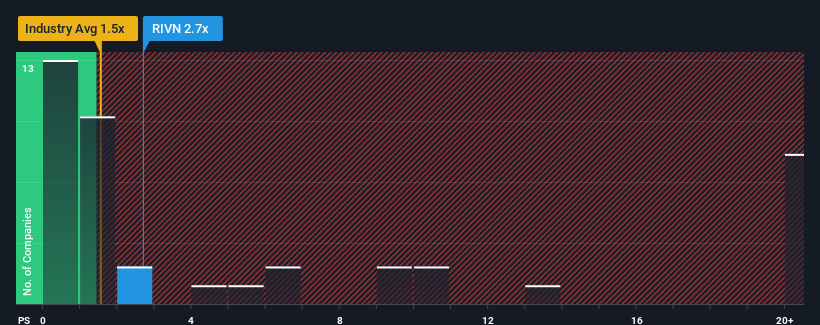- United States
- /
- Auto
- /
- NasdaqGS:RIVN
Rivian Automotive, Inc.'s (NASDAQ:RIVN) 26% Cheaper Price Remains In Tune With Revenues

Rivian Automotive, Inc. (NASDAQ:RIVN) shares have retraced a considerable 26% in the last month, reversing a fair amount of their solid recent performance. The drop over the last 30 days has capped off a tough year for shareholders, with the share price down 38% in that time.
Even after such a large drop in price, when almost half of the companies in the United States' Auto industry have price-to-sales ratios (or "P/S") below 1.5x, you may still consider Rivian Automotive as a stock probably not worth researching with its 2.7x P/S ratio. However, the P/S might be high for a reason and it requires further investigation to determine if it's justified.
View our latest analysis for Rivian Automotive

How Has Rivian Automotive Performed Recently?
Rivian Automotive certainly has been doing a good job lately as it's been growing revenue more than most other companies. It seems the market expects this form will continue into the future, hence the elevated P/S ratio. You'd really hope so, otherwise you're paying a pretty hefty price for no particular reason.
If you'd like to see what analysts are forecasting going forward, you should check out our free report on Rivian Automotive.What Are Revenue Growth Metrics Telling Us About The High P/S?
Rivian Automotive's P/S ratio would be typical for a company that's expected to deliver solid growth, and importantly, perform better than the industry.
If we review the last year of revenue growth, the company posted a terrific increase of 68%. Still, revenue has barely risen at all from three years ago in total, which is not ideal. Therefore, it's fair to say that revenue growth has been inconsistent recently for the company.
Looking ahead now, revenue is anticipated to climb by 34% each year during the coming three years according to the analysts following the company. Meanwhile, the rest of the industry is forecast to only expand by 19% each year, which is noticeably less attractive.
With this in mind, it's not hard to understand why Rivian Automotive's P/S is high relative to its industry peers. It seems most investors are expecting this strong future growth and are willing to pay more for the stock.
What We Can Learn From Rivian Automotive's P/S?
There's still some elevation in Rivian Automotive's P/S, even if the same can't be said for its share price recently. Typically, we'd caution against reading too much into price-to-sales ratios when settling on investment decisions, though it can reveal plenty about what other market participants think about the company.
We've established that Rivian Automotive maintains its high P/S on the strength of its forecasted revenue growth being higher than the the rest of the Auto industry, as expected. It appears that shareholders are confident in the company's future revenues, which is propping up the P/S. It's hard to see the share price falling strongly in the near future under these circumstances.
It's always necessary to consider the ever-present spectre of investment risk. We've identified 3 warning signs with Rivian Automotive, and understanding them should be part of your investment process.
If strong companies turning a profit tickle your fancy, then you'll want to check out this free list of interesting companies that trade on a low P/E (but have proven they can grow earnings).
New: AI Stock Screener & Alerts
Our new AI Stock Screener scans the market every day to uncover opportunities.
• Dividend Powerhouses (3%+ Yield)
• Undervalued Small Caps with Insider Buying
• High growth Tech and AI Companies
Or build your own from over 50 metrics.
Have feedback on this article? Concerned about the content? Get in touch with us directly. Alternatively, email editorial-team (at) simplywallst.com.
This article by Simply Wall St is general in nature. We provide commentary based on historical data and analyst forecasts only using an unbiased methodology and our articles are not intended to be financial advice. It does not constitute a recommendation to buy or sell any stock, and does not take account of your objectives, or your financial situation. We aim to bring you long-term focused analysis driven by fundamental data. Note that our analysis may not factor in the latest price-sensitive company announcements or qualitative material. Simply Wall St has no position in any stocks mentioned.
About NasdaqGS:RIVN
Rivian Automotive
Designs, develops, manufactures, and sells electric vehicles and accessories.
Excellent balance sheet with limited growth.
Similar Companies
Market Insights
Community Narratives



